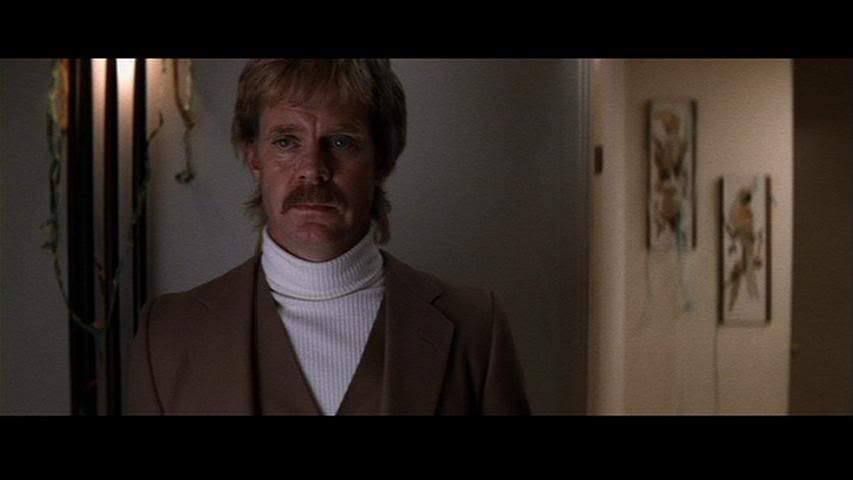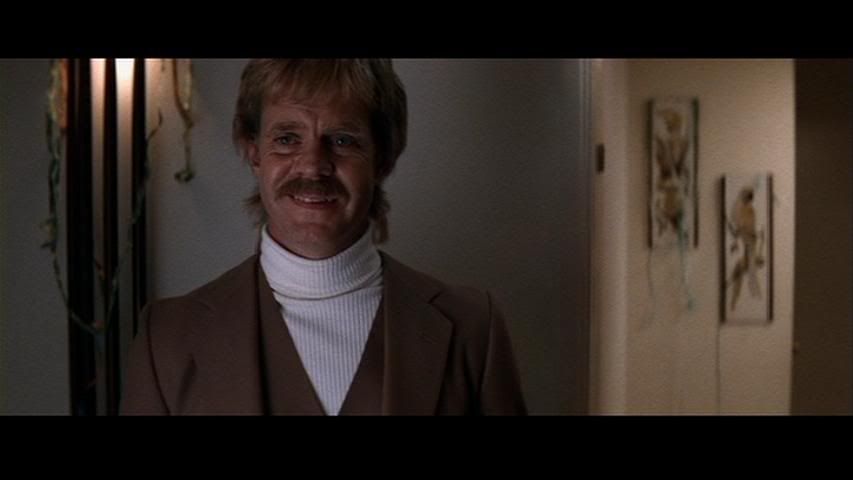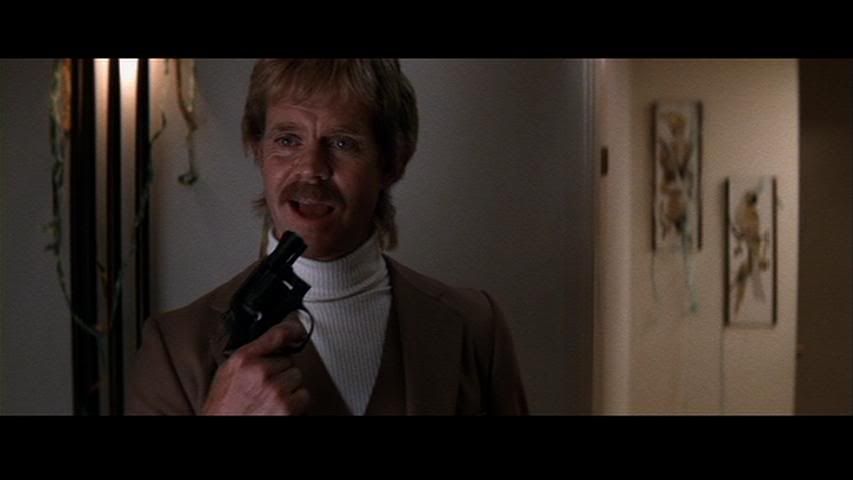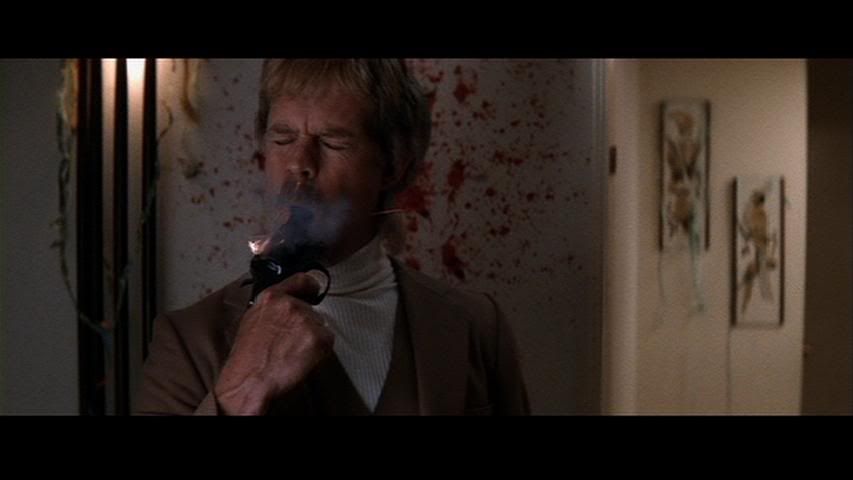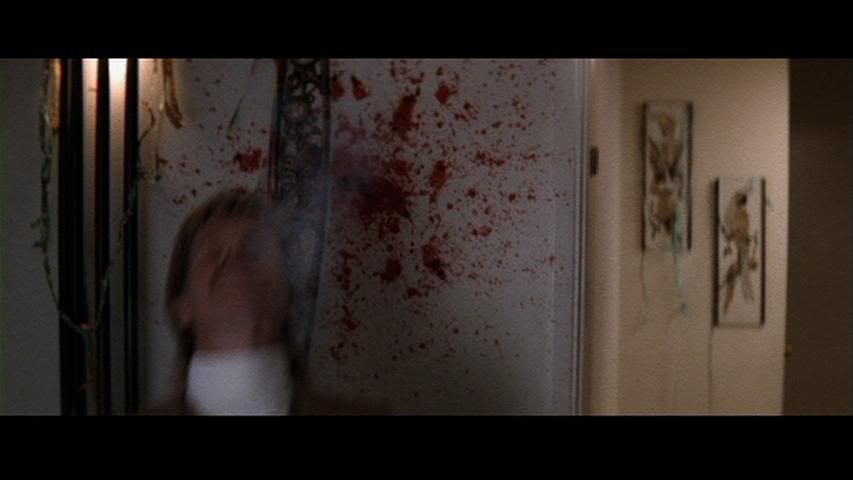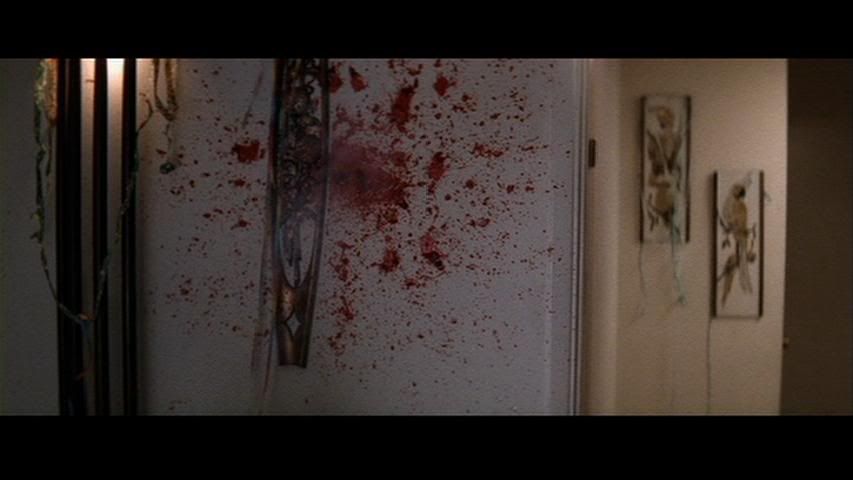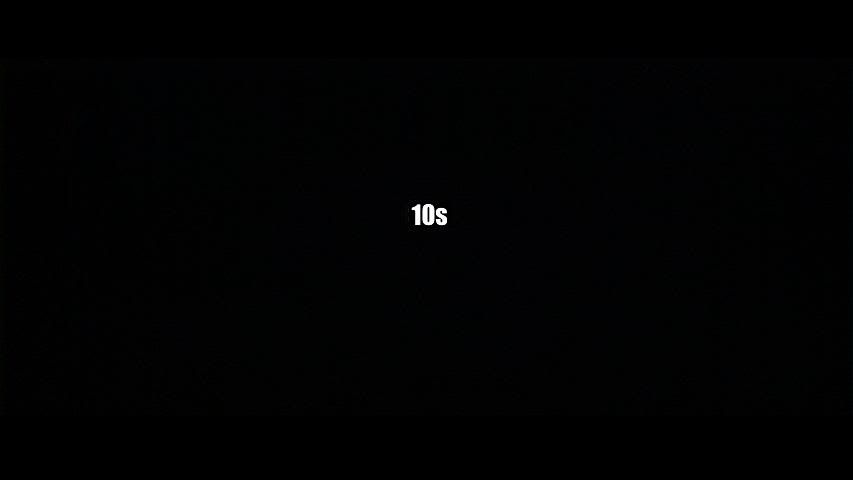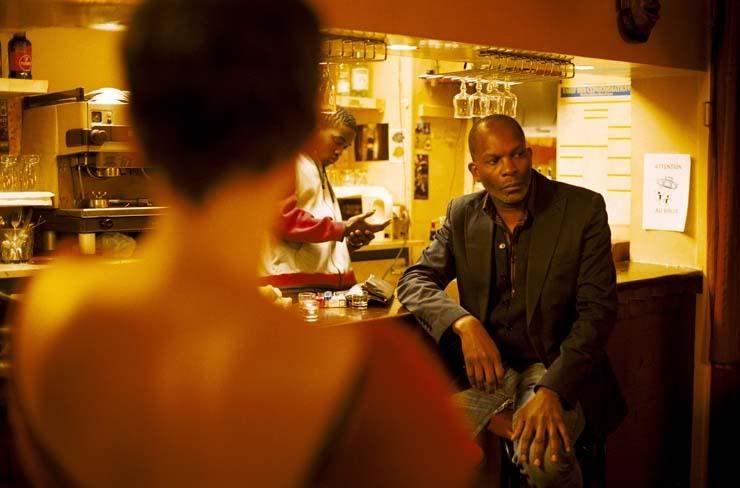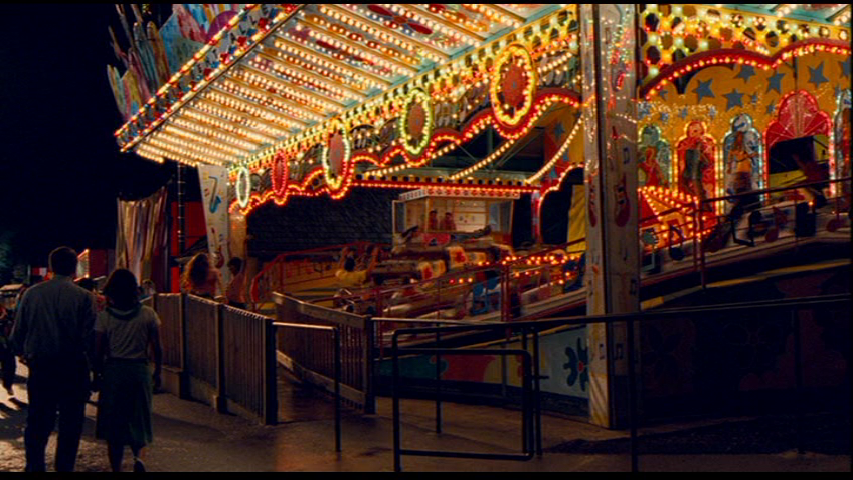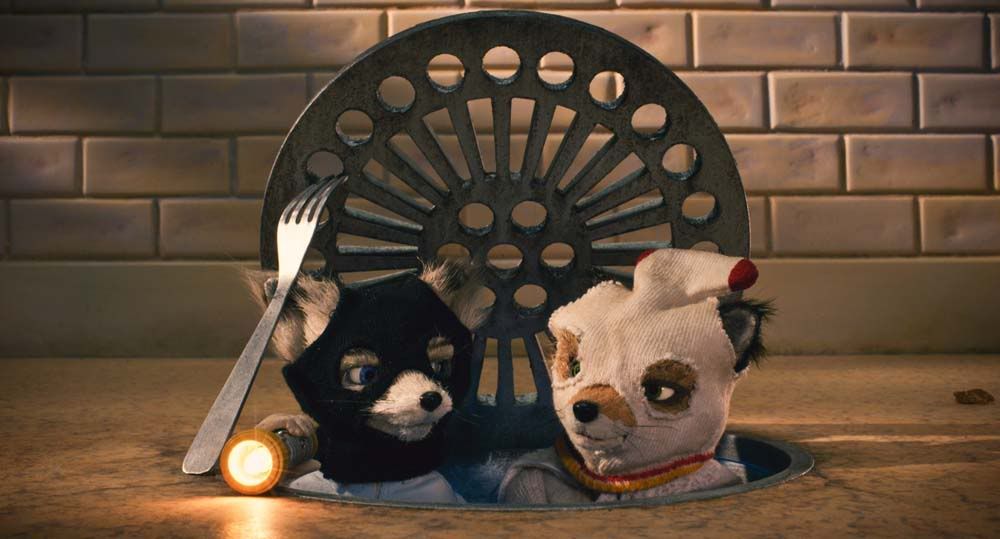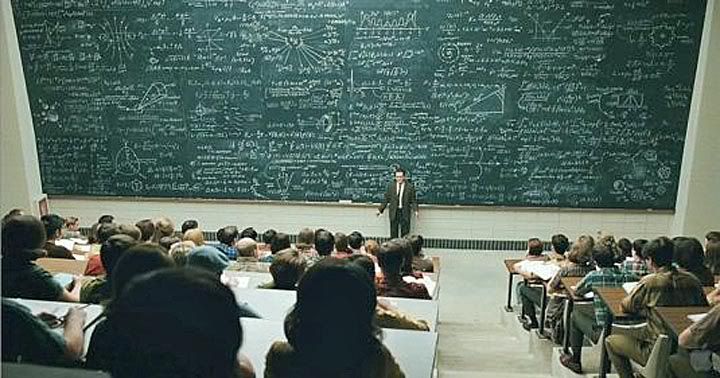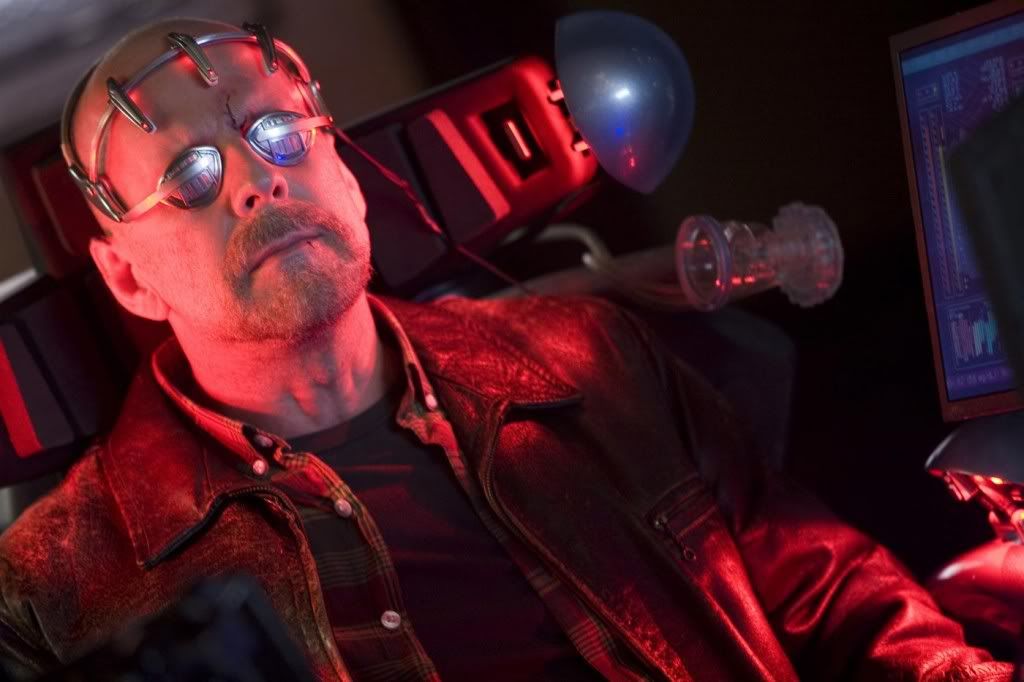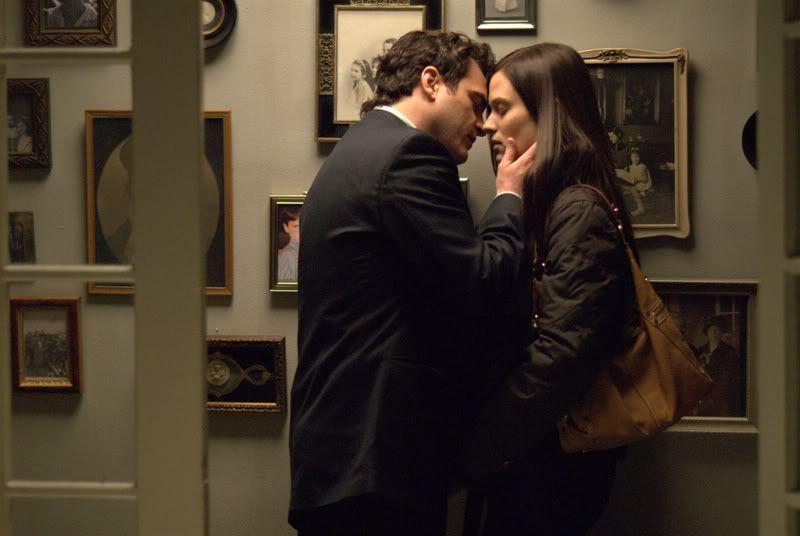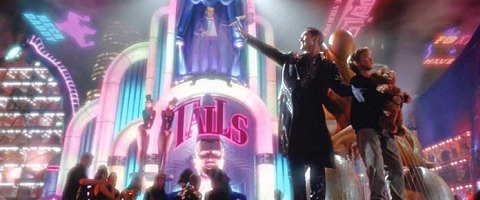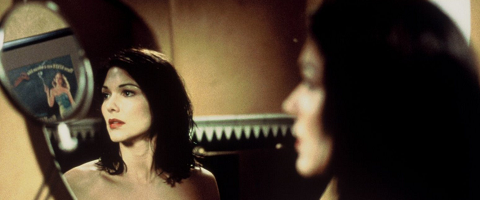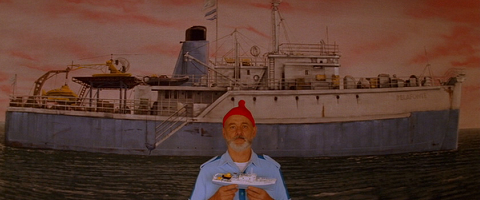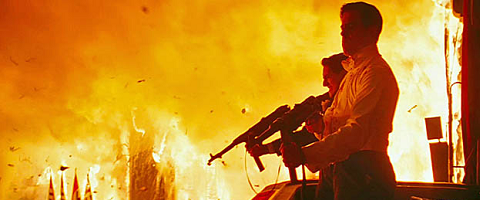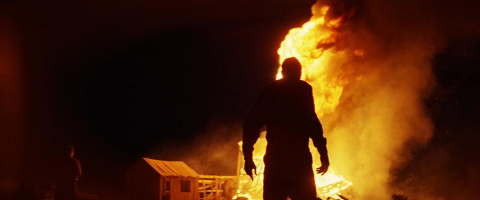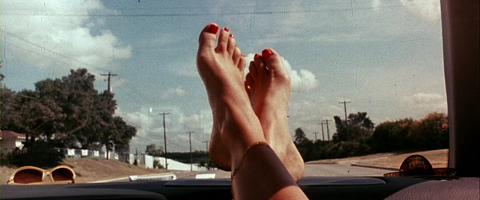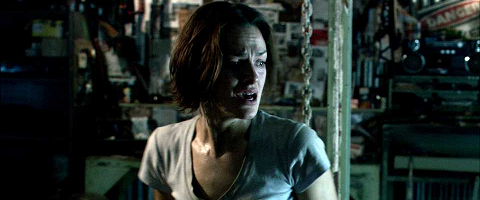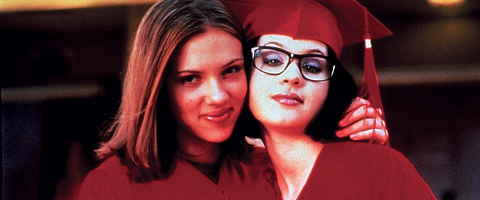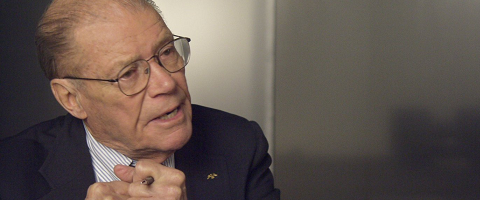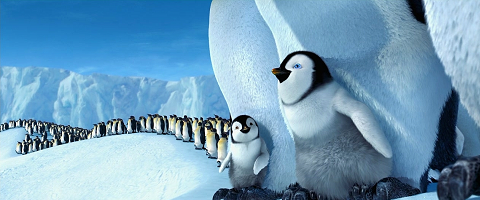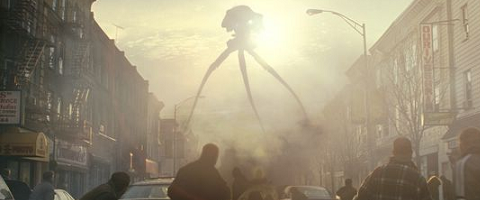Dec 31, 2009
150: Up in the Air, The Hurt Locker
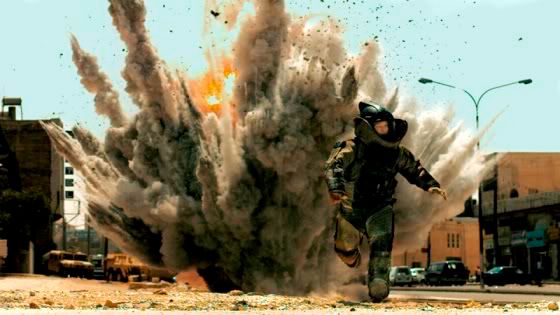 THE HURT LOCKER (Kathryn Bigelow, 2009): Arguably the first great war film for our generation (warts and all, I'd include Redacted's inclusion on such a list, but I digress), Kathryn Bigelow's The Hurt Locker is, among many things, a model example of examining the universal (political) via the singular (personal). Plot is scant, the thematic rumblings better for it: after an insurgent attack kills the leader of an Explosive Ordnance Disposal team in Iraq, Sergeant William James (Jeremy Renner) fills in his shoes, quickly turning heads as a reckless "wild man" in his devil-may-care approach to the constantly life-threatening tasks at hand. Among the best of recent shaky-cam implementations (take that, Greengrass), Bigelow's roughly-hewn approach emphasizes the rush of battle and complicates typically easy psycho-sexual metaphors (Jarhead) into something far more existentially confrontational. A singular, obvious screenwriting tactic is all that upsets this transfixing and vital vision. A-
THE HURT LOCKER (Kathryn Bigelow, 2009): Arguably the first great war film for our generation (warts and all, I'd include Redacted's inclusion on such a list, but I digress), Kathryn Bigelow's The Hurt Locker is, among many things, a model example of examining the universal (political) via the singular (personal). Plot is scant, the thematic rumblings better for it: after an insurgent attack kills the leader of an Explosive Ordnance Disposal team in Iraq, Sergeant William James (Jeremy Renner) fills in his shoes, quickly turning heads as a reckless "wild man" in his devil-may-care approach to the constantly life-threatening tasks at hand. Among the best of recent shaky-cam implementations (take that, Greengrass), Bigelow's roughly-hewn approach emphasizes the rush of battle and complicates typically easy psycho-sexual metaphors (Jarhead) into something far more existentially confrontational. A singular, obvious screenwriting tactic is all that upsets this transfixing and vital vision. A- UP IN THE AIR (Jason Reitman, 2009): Like its antisocial protagonist - a "Terminations Expert" (George Clooney) hired out to companies solely for the purpose of delivering pink slips - Up in the Air's problems lie primarily in a an inability to communicate and an indecisiveness as to what it wants in the first place. The film bites off more than it knows how to chew (particularly the confused third act) and asks us to swallow it wholesale. Purportedly a reflection of our Current State of Affairs, the film trots out a healthy mixture of celebrities and non-actors for tearful employment dispatches, yet these sequences never accrue a sense of purpose beyond mere lip service to social trends (Oscar, are you listening?), one reinforced by the fairy-tale sense of remove the film takes to its chief subject. Responsibility to the fellow man takes a backseat to Screenplay 101 hysteria, made largely palatable by an able cast of celebrities (finally, a film that recognizes Vera Farmiga's luminous screen presence) whose knowing smarm almost relegates this bout of well-polished bullshit to the realm of auto-critique where it belongs. Without having achieved that status, Up in the Air is merely oblivious. C
UP IN THE AIR (Jason Reitman, 2009): Like its antisocial protagonist - a "Terminations Expert" (George Clooney) hired out to companies solely for the purpose of delivering pink slips - Up in the Air's problems lie primarily in a an inability to communicate and an indecisiveness as to what it wants in the first place. The film bites off more than it knows how to chew (particularly the confused third act) and asks us to swallow it wholesale. Purportedly a reflection of our Current State of Affairs, the film trots out a healthy mixture of celebrities and non-actors for tearful employment dispatches, yet these sequences never accrue a sense of purpose beyond mere lip service to social trends (Oscar, are you listening?), one reinforced by the fairy-tale sense of remove the film takes to its chief subject. Responsibility to the fellow man takes a backseat to Screenplay 101 hysteria, made largely palatable by an able cast of celebrities (finally, a film that recognizes Vera Farmiga's luminous screen presence) whose knowing smarm almost relegates this bout of well-polished bullshit to the realm of auto-critique where it belongs. Without having achieved that status, Up in the Air is merely oblivious. CDec 29, 2009
Catching Up: Sherlock Holmes, Precious: Based on the Novel "Push" by Sapphire
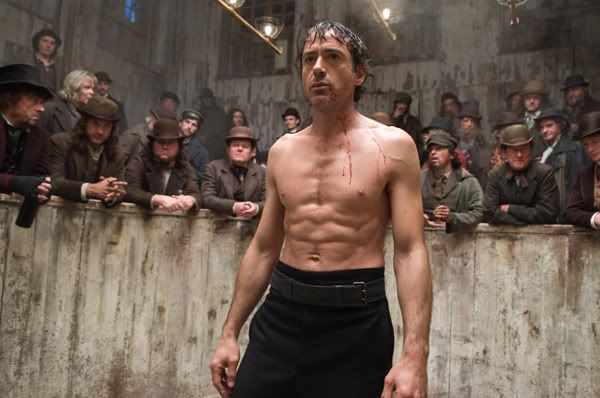
Guy's raucous filmmaking tendencies mesh amiably with big-budget sensibilities in this retooling of the classic literary sleuth; save for a pleasantly traditional plot not far from Scooby-Doo territory, not a gear at work is less than fully realized. Zimmers's score amplifies Ritchie's verve with epic swirl, although the in-combat editing often frustrates action unlike the too-disconnected fisticuffs of Batman Begins. The camera's eye is swoon-worthy yet less gonzo than either Revolver or RocknRolla, a well-made choice in that it allows a precise, seemingly effortless Robert Downey, Jr. (quickly becoming the movie star of our time) to more fully take the reigns. He and Jude Law's interplay (some of the best in recent memory) is delivered sans gay panic, which is to say such implied humor is just that (implied). The increasingly savory Ritchie has delivered a miracle: a film in the National Treasure format actually worth a damn. [B+]

Precious wants, so very badly, to give us perspective into the trials of its prototypical inner city youth that it arguably goes overboard in its callow flaunting of unpleasantries (rape, greasy foods, rape again, AIDS...). The titular teenage black girl (in an acutely realized, broadly pitched performance by Gabourey Sidibe; Oscar, are you listening?), described as a composite character, trounces Larry Gopnik for sheer suffering quota. Armond White's invocation of Griffith is appropriate, if misplaced; the film has a powerful, if comparatively shrill, sense of unfolding human drama. Precious's escapist daydreams are as slap-it-on-thick as anything by Paul Haggis, so no wonder Ebert and Oprah want to make love in its shadow. At the end of the day, it comes out on top - if barely - because its flaws are more so of the executional than the conceptual kind, the whole more than the sum of its parts. [B-]
Dec 26, 2009
2009: Year in Film, A Photo Essay (First Draft)
A rough sampling of my 2009 favorites, to tide things over while I catch up on a few more dozen blind spots. A more complete (and elaborate) year-in-review post will come in January.
35 Shots of Rum (Claire Denis)
Adventureland (Greg Motolla)
Fantastic Mr. Fox (Wes Anderson)
Inglourious Basterds (Quentin Tarantino)
Julia (Erick Zonca)
Public Enemies (Michael Mann)
A Serious Man (Ethan and Joel Coen)
The Sun (Aleksandr Sokurov)
Surrogates (Jonathan Mostow)
Dec 22, 2009
Avatar: Notes on a Second Viewing
Screened in 2D. Original review here.
As suspected, the 3D version of Avatar I experienced in IMAX on opening day was anything but the complete "immersion" that many have proclaimed in their hallelujahs of the film. (Granted, this might boil down to nothing more than a simple matter of personal preference, and my understanding is that anyone with either glasses or contacts is more likely to experience visual unpleasantries with the 3D Avatar.) Basking in the inviting - rather than imposing - environment of 2D, the ravishing landscape vistas and imaginative character/creature designs of Cameron's long-gestating baby were far more engaging to these eyes - viscerally, poetically, emotionally. That being said, I'm still not a fan of the work, and have to wonder if this is how the majority of Star Wars fans felt in the days and weeks after Episode I. On paper, there's certainly more to love than hate, but the experiential whole is still much, much less than the sum of the parts. Despite much in the way of considerable artistry, at the end of the day, I'd much rather play a truly immersive, Fallout 3-style videogame set on Pandora than slog through 160 minutes of the hands-off demo only to be left with blue balls.
Some films exhaust you out of sheer sensory overload or emotional experience, while others do so because they outstay their welcome. Avatar falls a little bit into both categories. Though certainly better off without the technology being so superficially flaunted (thankfully, the film avoids gimmicky 3D shots, but still), the fact remains that, once the novelty of the new toys wears off, there isn't much left in the way of either conceptual development or kinetic vigor to keep things afloat. As motion capture creations, the Na'vi are astonishingly real; once the initial amazement wears off, the blandness of the storytelling more readily rises to the surface. To these eyes, Cameron has always successfully juggled the dual sides of entertainment and substance until now, and while I was never one to go for the pre-release (hell, pre-production) Avatar Kool-Aid, the film still manages to set itself up for disappointment on virtually all fronts.
Much of Avatar suggests a work of nearly limitless potential having been watered down so as to appeal to a larger audience; that Titanic got away with a PG-13 rating was perhaps the greatest stunt ever pulled on the MPAA, whereas the relatively bloodless (figuratively and literally) Avatar instead plays into puritanical, family-friendly expectations. (I wouldn't go within four clicks of a fast food joint, but if the gluttony of tie-ins abound are any indication, you can probably get a Na'vi toy in your Happy Meal these days, natch.) This is particularly aggravating in that the film's anti-capitalist overtones are kept at a safe, whitewashed distance. In mounting so much around the historical trend of the developed exploiting the technologically inferior, the film trades almost exclusively in lip service, suggesting that Cameron was too timid to theoretically bite the hand that feeds him (this assumes he believes what he's selling us in the first place; Star Wars: Episode III - Revenge of the Sith, WALL-E and Speed Racer all scrutinized similar notions of greed and justice to far more edifying ends, and each was loads more fun at that). Only the bravura sequence (spoilers ahead) in which the Na'vi's Hometree is destroyed (along with War of the Worlds, the most moving blockbuster evocation of 9/11 to date) does the film evoke a genuine sense of loss, fleeting though it may be.
Of all my second viewing fluctuations, I'm most pleased to say that the cast entire fares much better when not jumping off the screen like flimsy cardboard cutouts, which is to say that I no longer feel so ungodly embarrassed for the lot of them. On the page, Sam Worthington has less to work with here than in Terminator Salvation, but he proves an able everyman and gives the film most of what little dramatic resonance it has (here's to hoping this film boosts his career into the stratosphere). Cameron can't quite nail the one-liners like he used to, so moments of awkwardness abound even as the actors give it their all; only the delectable Stephen Lang, as the villainously single-minded Colonel, succeeds in creating a true characterization. In comparison, I'll take Lucas' prequels any day of the week, as those films' performances more acutely captured the archetypal B-movie essence at their respective cores - perhaps imperfect, but always feeling.
More so than a technical accomplishment, Avatar is a golden example of a director doing less with more, a trait exacerbated by the numerous instances in which it recalls his own Aliens - a film superior on every front, save possibly for makeup (personal preferences dictate that that film's model work and alien body suits outpace even the superb digital creations of Pandora and the Na'vi). Such overlapping elements - Sigourney Weaver, humanoid fighting machines, cartoonish military personalities - are largely superficial, but also point to more cardinal failures. A drag at 160 minutes, large stretches of Avatar actually demand a more leisurely pace so as to better absorb the sumptuous nuances of the world conceived for it. Even the most memorable of images often end up feeling like just another domino in the line of a plot too dusty to stand on its own two feet.
For a film so indebted to the dreamwalker experience, only two scenes - one involving a cluster of airborne, jellyfish-like creatures, the other witness to several Na'vi climbing Pandora's levitating mountain range - successfully create a mindspace of seemingly boundless wonder and awe. Surely, Cameron is flexing his creative muscles, but the film never overcomes the nagging feeling that he's also simply going through the motions, forgoing the expert potboiling of his earlier work. Was the King of the World afraid of boring an audience, of being labeled that worst of all monikers, artsy? If so, for shame, for what could have been the trippiest sci-fi smorgasbord since Kubrick took up the reigns of the genre has instead been reduced to a widget.
Dec 18, 2009
Avatar (2009): B-
Oh, how far the mighty have fallen. More than a decade in the making, the much-hyped, ravenously-followed-even-before-its-production Avatar is nothing less than the third time (assuming the unofficially reported tallies of $350 million) director James Cameron has delivered the most expensive movie ever made, after the then-record-setting budgets of 1991's Terminator 2: Judgment Day and 1997's Titanic. But whereas his previous works are typically remembered for both their savory implementation of groundbreaking special effects (always in the name of dramatic storytelling) as well as their sterling entertainment-oriented blockbuster artistry, the top-heavy Avatar stretches the worth of its visuals like silly putty frosting atop a narrative rendered with muted fervor and transparent emotions. Always a technocrat, the thrum of Cameron's modern classics stems primarily from a constant surge of suggested spontaneity; to its incalculable detriment, nary a moment goes by in Avatar that doesn't feel as though it's been overly thought out at the conceptual stage only to be all but processed to death on screen. In hindsight, the title seemingly refers less to a central plot element than it does the thought that the film itself is just an empty suit awaiting occupancy and a pulse.
This sci-fi epic would be a masterpiece if judged solely on its technical merits; on their strength alone, one can imagine a tweaked silent-film version being infinitely superior to the one now playing in theaters with no less than Roger Ebert warning the masses, "Good luck getting a ticket before February." Surely, Avatar will go down as yet another Cameronian landmark in the evolution of cinematic wizardry, yet no amount of razzle-dazzle can begin to compensate for a dusty storyline plagued by both a cumbersome screenplay that could well have been written in less time than it takes to watch the film itself (imagine Pocahontas, or rather, The New World, filtered through a sci-fi lens and simplified to its good guy/bad guy essentials) as well as an overly polished form of acting that never expresses emotion and feeling even half as much as it merely dictates plot details and spelled-out character motivations via streamlined sound bytes. That Cameron has worked successfully in such broad strokes before is not to his advantage here. Unlike the larger-than-life vividness of his Terminator films or the earnest, knowingly cheesy cliches of Titanic, what the genuinely humorless (Cameron's one-liners and sight gags have never felt so strained) Avatar most sorely lacks is a personal touch.
The world created for Avatar – the exotic alien planet of Pandora, where, a century and a half into the future, humans from a resource-deprived Earth hope to extract valuable minerals for profit at the expense of the computer generated locals (enter broad allegories to everything from Native American genocide to the current Iraq War) – is a CG wonder to behold, and as such is the film's bread and butter. Even The Lord of the Rings' Gollum can't touch the level of physical detail instilled into the digitally-rendered Na'vi (the indigenous Pandora inhabitants), who transcend previously expected special effect barriers, convincing even these most scrutinous eyes that what is on display is true flesh and blood. With the sincere hope of better enjoying this project in the potentially more story-friendly context of a 2D, non-IMAX exhibition, I plan on seeing it again, if only to better absorb the detail work that sparkles in every frame. Such minor touches – the way the ground-level vegetation lights up as it is walked on, like the sidewalks in Michael Jackson's Billie Jean video, or the rush of the wind as the Na'vi ride dragon-like creatures down the side of a cliff face - are among the fleeting, genuinely feeling joys to be found herein. Alas, barring such a second-viewing turnaround, Avatar represents the maiden wreck in the eyes of this otherwise unabashed Cameron devotee. The ideal viewing experience may very well 3D, but where it matters most, the overwrought Avatar proves regrettably flat.
Dec 10, 2009
Catching Up: 35 Shots of Rum, 9, Brüno
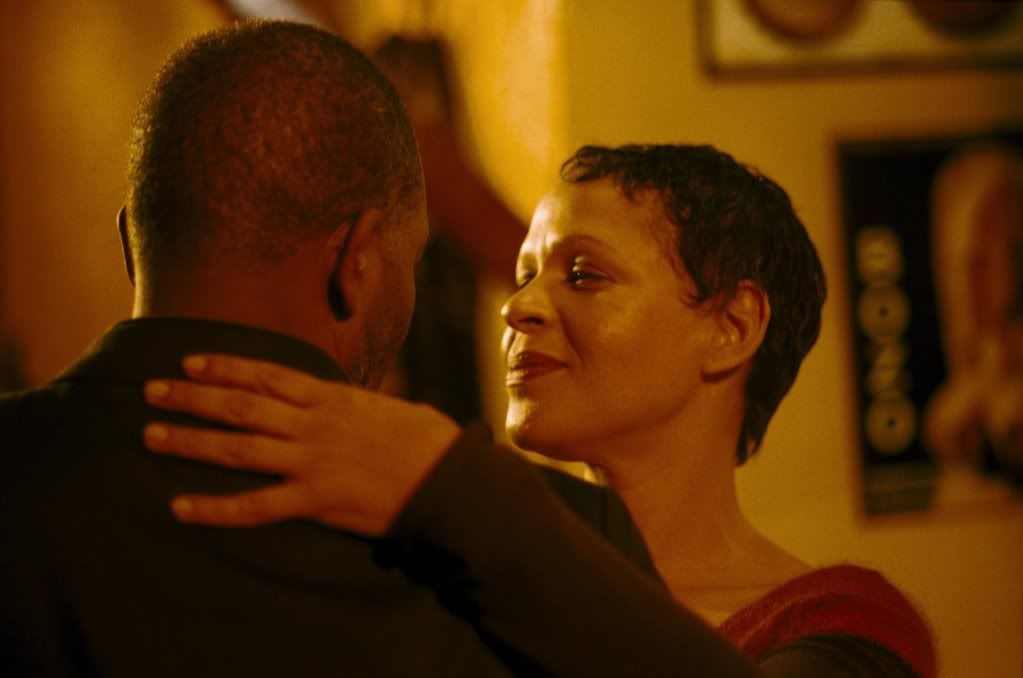
This is the first of Denis' I've had the privilege of experiencing, a designation worth emphasizing in the case of a film this sumptuous and full of life. Absent is heavy-lifting or forced artistry; 35 Shots of Rum seems less a narrative work of cinema than a poet's stream-of-consciousness ruminations somehow caught in the medium. Quixotic opening shots of the minimalist story's central railway systems (acting as something of a silent metaphor for the characters' lives) set the pace for this deliberate yet effortless look at the uneasy family unit maintained by four neighbors (one father and daughter, one younger man and one middle-aged woman) and the universal trials and pleasures experienced by all over the film's unstated period of time. Life charges forward with unforgiving absolution - the enigmatic cafe sequence, perhaps the greatest sequence in any film this year, is almost regrettable in its eventual mortality - and so does 35 Shots of Rum gaze wisely and humanely on our collective need to love, be loved, and ultimately let go. [A+]

Terminator light, the animated post-apocalypse 9 is only half as emotive as its gorgeous surface would suggest. Near ground zero of the now-past war between man and machine resides a small handful of puppet-like creations (think humanoid potato sacks), each having been given their own integer, struggling to survive in this most unforgiving of environments. The titular 9 (Elijah Wood, who needs to stop playing the chosen one like Morgan Freeman needs to stop playing the elderly saint) is the last to awaken, and proves a necessary gadfly to the existence carved out for the others by the overly cautious 1. Character design is the biggest triumph here, from the tender emotions imparted by their synthetic bodies to the various distinguishing attributes scattered about (the kino-eye flickering of the twins ravishingly equates the cinema with the soul). A visual triumph, the screenwriting is nevertheless a buzzkill, particularly in the assumptive profundity to be found in the many otherwise unexplained, pseudo-spiritual plot developments. Substance abuse might improve the experience, but alas, 9 unto itself is only half-baked. [B-]

The first 45 minutes of Bruno, the follow-up to overrated Borat: Cultural Learnings of America for Make Benefit Glorious Nation of Kazakhstan, is not only funnier than that entire feature, but might be the most concentrated bit of cinematic hilarity since Aqua Teen Hunger Force Colon Movie Film for Theaters. Shamelessly pushing buttons and breaking through boundaries of social acceptability, Sacha Baron Cohen's stunt as a hopelessly inept, homosexual German fashionista trying to gain celebrity tries to be nothing less than the most offensive bit of trailblazing since The Birth of a Nation. Left unto these stunts alone, the film soars: from the trap set for Paula Abdul (without furniture in his new residence, Brüno pays his minority staff bonus to pose as tables and chairs) to the sure-to-be-infamous TV pilot involving a talking penis ("Does this look like the dancing of a talentless idiot?!"), Brüno is the revelatory act of a Socratic gadfly. Were such also the case for the limply plot-oriented second half - which loses focus and becomes base in its exploitation (which is to say, it recalls Borat) - this might have been one for the ages. [B-]
Dec 5, 2009
The Cove (2009): A-
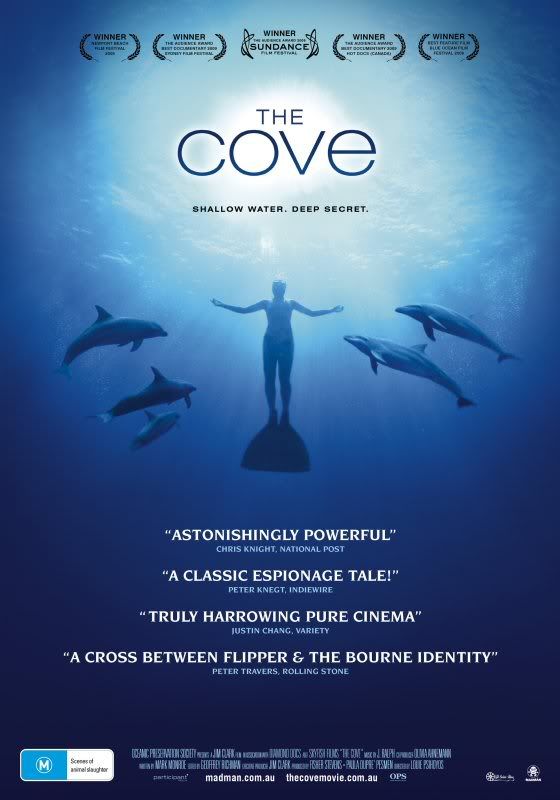 "Never rely on governments to do anything... the entirety of social progress can be traced back to the passion of the individual." So goes the (highly paraphrased) central line in The Cove, a revelatory documentary that stands as one of the finest acts of activism via cinema yet achieved. Louie Psihoyos' film follows the unrelentingly persistent Richard O'Barry in his quest to end the dolphin captivity trade, one he feels personally responsible for bringing about in the first place (however inadvertently so), having been the trainer for the dolphins used in the popular 60s sitcom Flipper. Said mission takes on ecstatic, Ocean's Eleven-like rigor as a team of similarly dedicated individuals pool their collective resources and skills to expose the central conspiracy that continues to see some 23,000 dolphins and porpoises captured and killed annually in Taiji, Japan, one of several small towns in which the barbaric harvesting process continues thanks to a government-aided media blackout. The title refers to a natural fortress near the bayside into which the animals are herded for the slaughter (always just out of public view; note, early in the film, the reddish glow that can be glimpsed emanating from the water), the healthier specimens having already been selected and purchased for aquariums round the world, often going for $150,000 apiece. Japanese spokespersons, astonishingly full of shit, assure the public that the animals die quickly, painlessly, while the toxic meat (tainted by astronomical pollution levels) is donated to public schools for mandatory consumption in a propagandistic attempt to bring about an end to the official ban on whaling, one the International Whaling Commission has proven altogether useless in remedying a la the Japanese government's bribing of third world nations to join the organization so as to vote for its reinstitution. Culminating in a blood-soaked, heart-wrenching sequence of invaluable slaughter footage as vital as it is painful to watch, The Cove is as much a call to arms against capitalism at the expense of our natural world as it is a confirmation of human dignity in the face of the unspeakable. Text "dolphin" to 44144. Now.
"Never rely on governments to do anything... the entirety of social progress can be traced back to the passion of the individual." So goes the (highly paraphrased) central line in The Cove, a revelatory documentary that stands as one of the finest acts of activism via cinema yet achieved. Louie Psihoyos' film follows the unrelentingly persistent Richard O'Barry in his quest to end the dolphin captivity trade, one he feels personally responsible for bringing about in the first place (however inadvertently so), having been the trainer for the dolphins used in the popular 60s sitcom Flipper. Said mission takes on ecstatic, Ocean's Eleven-like rigor as a team of similarly dedicated individuals pool their collective resources and skills to expose the central conspiracy that continues to see some 23,000 dolphins and porpoises captured and killed annually in Taiji, Japan, one of several small towns in which the barbaric harvesting process continues thanks to a government-aided media blackout. The title refers to a natural fortress near the bayside into which the animals are herded for the slaughter (always just out of public view; note, early in the film, the reddish glow that can be glimpsed emanating from the water), the healthier specimens having already been selected and purchased for aquariums round the world, often going for $150,000 apiece. Japanese spokespersons, astonishingly full of shit, assure the public that the animals die quickly, painlessly, while the toxic meat (tainted by astronomical pollution levels) is donated to public schools for mandatory consumption in a propagandistic attempt to bring about an end to the official ban on whaling, one the International Whaling Commission has proven altogether useless in remedying a la the Japanese government's bribing of third world nations to join the organization so as to vote for its reinstitution. Culminating in a blood-soaked, heart-wrenching sequence of invaluable slaughter footage as vital as it is painful to watch, The Cove is as much a call to arms against capitalism at the expense of our natural world as it is a confirmation of human dignity in the face of the unspeakable. Text "dolphin" to 44144. Now.
Dec 3, 2009
Where the Wild Things Are (2009): B
 To those who fell instantly head over heels for Where the Wild Things Are, I can only say I'm envious. Occupying that realm somewhere between a complete mess and a flawed masterpiece (a second viewing will hopefully clarify things), Spike Jonze's audacious adaptation of Maurice Sendak's classic storybook gets major points for an altogether sublime recollection of childhood's growing pains (the film had me from the pivotal snowball fight), best articulated in the rapport between Max Records and Catherine Keener as the distraught young boy Max and his exasperated single mother. Alas, after their shared, poignant early scenes, necessary (read: plot-forwarding) drama kicks in with a disingenuously deliberate level of spontaneity; the defining scuffle feels less like real people flying off the handle than preorchestrated mayhem. Such misguidedly careful emotional definition extends to the otherworldly paradise of Max's imagination, a far-off island he flees to in the night and where he ascends the throne as ruler of the Wild Things (astonishing creations of - makeup and CGI? I'd rather not know, although I could have done without the celebrity voice casting). Rather breathless in execution, the film's elemental visual textures and rigorous character developments nevertheless feel overly thought out, polished within an inch of their grunge-infused life, what Keith Uhlich refers to as "a forced paradise". I don't doubt that the film will eventually become something of a modern classic - only that it might not really deserve it.
To those who fell instantly head over heels for Where the Wild Things Are, I can only say I'm envious. Occupying that realm somewhere between a complete mess and a flawed masterpiece (a second viewing will hopefully clarify things), Spike Jonze's audacious adaptation of Maurice Sendak's classic storybook gets major points for an altogether sublime recollection of childhood's growing pains (the film had me from the pivotal snowball fight), best articulated in the rapport between Max Records and Catherine Keener as the distraught young boy Max and his exasperated single mother. Alas, after their shared, poignant early scenes, necessary (read: plot-forwarding) drama kicks in with a disingenuously deliberate level of spontaneity; the defining scuffle feels less like real people flying off the handle than preorchestrated mayhem. Such misguidedly careful emotional definition extends to the otherworldly paradise of Max's imagination, a far-off island he flees to in the night and where he ascends the throne as ruler of the Wild Things (astonishing creations of - makeup and CGI? I'd rather not know, although I could have done without the celebrity voice casting). Rather breathless in execution, the film's elemental visual textures and rigorous character developments nevertheless feel overly thought out, polished within an inch of their grunge-infused life, what Keith Uhlich refers to as "a forced paradise". I don't doubt that the film will eventually become something of a modern classic - only that it might not really deserve it.
Dec 2, 2009
Best of Decade: Part I
I suspect that those who follow my work even scantly will already be well aware that my love of compiling lists knows no bounds, and so, of course, the already prominent trend of announcing the best films of the decade was one I wanted to weigh in on as soon as possible. Alas, the Part I I've added to the title above is meant to indicate that this is, quite deliberately, a work in progress, and is meant to reflect my selections as they stand at the moment before I jump off the deep end in attempting to catch up on the literally hundreds of highly praised works from the past ten years that have so far eluded these eyes. Rentals, screeners and screenings galore await me for the next two months as I attempt to compile as complete a list as possible, both for my own purposes and for the in-development poll at Slant Magazine. Here, I encourage readers and friends to suggest additional titles for consideration, although it must be understood that only so many will ultimately be gotten to: from The Mad Songs of Fernanda Hussein to Jackass 2, the stacks of DVDs that await my consumption already abound. For the time being, I present this rough draft, a loose representation of the films that, more than any others these past ten years, I simply cannot live without.
12. Zodiac
13. Wendy and Lucy
14. Gangs of New York
15. The Wild Blue Yonder
16. 25th Hour
17. Into Great Silence
18. Inland Empire
19. Youth Withouth Youth
20. Donnie Darko
21. Before Sunset
22. Apocalypto
23. Code 46
24. Munich
25. The Lord of the Rings: The Fellowship of the Ring
26. L'Enfant
27. Death Proof (pictured)
28. Forty Shades of Blue
29. Five Dedicated to Ozu
30. Mission to Mars
31. No Country for Old Men
32. The White Diamond
33. Big Fish
34. Mysterious Skin
35. Spider (pictured)
36. House of Flying Daggers
37. Kill Bill: Volume 2
38. Reprise
39. I'll Sleep When I'm Dead
40. The Royal Tenenbaums
41. A History of Violence
42. My Blueberry Nights
43. Waking Life
44. The Lord of the Rings: The Return of the King
45. Femme Fatale
46. Revolver
47. Punch-Drunk Love
48. Neil Young: Heart of Gold
49. Paranoid Park
50. Wolf Creek (pictured)
51. Rachel Getting Married
52. Ghost World (pictured)
53. W.
54. Last Days
55. The Edge of Heaven
56. Dogville
57. Paprika
58. Marie Antoinette
59. Rescue Dawn
60. Two Lovers
61. WALL-E
62. A Prairie Home Companion
63. The Fog of War (pictured)
64. We Own the Night
65. Wallace & Gromit: The Curse of the Were-Rabbit
66. The Curious Case of Benjamin Button
67. The Triplets of Belleville
68. The Duchesss of Langeais
69. The Manchurian Candidate
70. Saraband
71. Indiana Jones and the Kingdom of the Crystal Skull
72. The Company
73. The Fountain
74. Happy Feet (pictured)
75. A Serious Man
76. Letters from Iwo Jima
77. Brokeback Mountain
78. Bad Santa
79. Grizzly Man
80. Junebug
81. In America
82. Millennium Actress
83. Cast Away
84. War of the Worlds (pictured)
85. The Proposition
86. Dear Zachary: A Letter to a Son About His Father
87. Catch Me If You Can
88. Casino Royale
89. Adaptation.
90. Eastern Promises
91. Boarding Gate (pictured)
92. Lilo & Stitch
93. Hellboy II: The Golden Army
94. Public Enemies
95. Married Life
96. Ratatouille
97. Looney Tunes: Back in Action
98. The Squid and the Whale
99. Million Dollar Baby
100. Narc
2. THE NEW WORLD
3. MIAMI VICE
4. A.I. ARTIFICIAL INTELLIGENCE
5. MULHOLLAND DR.
6. THE LIFE AQUATIC WITH STEVE ZISSOU
7. AQUA TEEN HUNGER FORCE COLON MOVIE FILM FOR THEATERS
8. LOST IN TRANSLATION
9. SPEED RACER
10. INGLOURIOUS BASTERDS
11. There Will Be Blood (pictured)12. Zodiac
13. Wendy and Lucy
14. Gangs of New York
15. The Wild Blue Yonder
16. 25th Hour
17. Into Great Silence
18. Inland Empire
19. Youth Withouth Youth
20. Donnie Darko
21. Before Sunset
22. Apocalypto
23. Code 46
24. Munich
25. The Lord of the Rings: The Fellowship of the Ring
26. L'Enfant
27. Death Proof (pictured)
28. Forty Shades of Blue
29. Five Dedicated to Ozu
30. Mission to Mars
31. No Country for Old Men
32. The White Diamond
33. Big Fish
34. Mysterious Skin
35. Spider (pictured)
36. House of Flying Daggers
37. Kill Bill: Volume 2
38. Reprise
39. I'll Sleep When I'm Dead
40. The Royal Tenenbaums
41. A History of Violence
42. My Blueberry Nights
43. Waking Life
44. The Lord of the Rings: The Return of the King
45. Femme Fatale
46. Revolver
47. Punch-Drunk Love
48. Neil Young: Heart of Gold
49. Paranoid Park
50. Wolf Creek (pictured)
51. Rachel Getting Married
52. Ghost World (pictured)
53. W.
54. Last Days
55. The Edge of Heaven
56. Dogville
57. Paprika
58. Marie Antoinette
59. Rescue Dawn
60. Two Lovers
61. WALL-E
62. A Prairie Home Companion
63. The Fog of War (pictured)
64. We Own the Night
65. Wallace & Gromit: The Curse of the Were-Rabbit
66. The Curious Case of Benjamin Button
67. The Triplets of Belleville
68. The Duchesss of Langeais
69. The Manchurian Candidate
70. Saraband
71. Indiana Jones and the Kingdom of the Crystal Skull
72. The Company
73. The Fountain
74. Happy Feet (pictured)
75. A Serious Man
76. Letters from Iwo Jima
77. Brokeback Mountain
78. Bad Santa
79. Grizzly Man
80. Junebug
81. In America
82. Millennium Actress
83. Cast Away
84. War of the Worlds (pictured)
85. The Proposition
86. Dear Zachary: A Letter to a Son About His Father
87. Catch Me If You Can
88. Casino Royale
89. Adaptation.
90. Eastern Promises
91. Boarding Gate (pictured)
92. Lilo & Stitch
93. Hellboy II: The Golden Army
94. Public Enemies
95. Married Life
96. Ratatouille
97. Looney Tunes: Back in Action
98. The Squid and the Whale
99. Million Dollar Baby
100. Narc
Subscribe to:
Comments (Atom)

